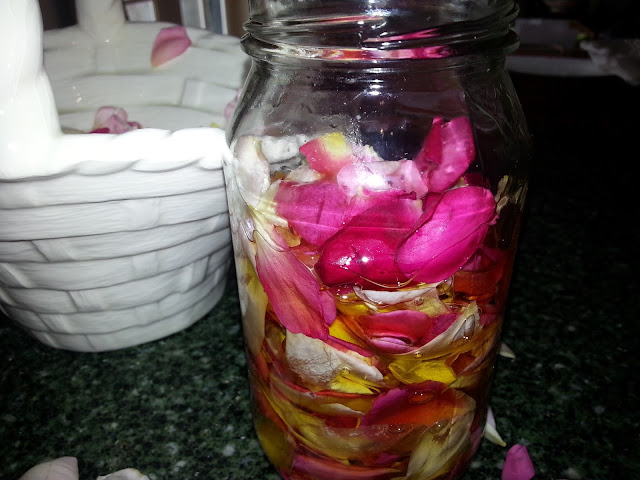And, sometimes, I think I should find a real job, despite their lack in this regional area, rather than continue. Or so it sometimes seems. Especially when people ask that ubiquitous question, 'And what do you do'? As a former academic and researcher, I now hear myself say, "I grow heirloom roses, and I run therapeutic workshops".
The responses to my 'occupation' vary slightly, but always there's a slight pause followed by a dismissive, "Oh, that must be nice!", or, "My grandmother, elderly aunt/cousin grew roses".
This comment often precedes a brain picking session along the lines of, "I have this rose plant and it looks like this, but I don't know it's name. Can you tell me"? or, "My rose/lemon tree/tomato plant has yellow leaves/black spots/no flowers" and I'm asked to diagnose the problem and offer a solution on the spot!
Of course, I'm always polite. But these responses make me ponder the 'less than' value we as a westernised society place on gardening and horticulture generally. Unless, of course, I then talk about the economic value of what I do, as in selling the roses as cut flowers, creating wedding flowers, using the roses and herbs I grow in the rose balms and soaps I make, or using the rose gardens as a therapeutic space for workshops.
If I then talk about my real passions; of creating beauty in this harsh world, of educating about the benefits of engaging with the natural environment for our wellbeing, of using natural products in our every-day items rather than destroying large tracts of precious forest for monocrops such as palm oil, responses are often mixed, but rarely enthusiastic.
Unfortunately, the often muted response I receive is not because my 'passion' makes people feel uncomfortable. Rather, I am very often greeted with a complete wall of silence, a closing off and a lack of curiosity about our natural world. As someone who is able to hold the attention of university students, I have realised it is not my delivery that is the problem, but the topic!
Where is the wonder at the beauty and complexities of the natural world that my grandparents expressed? The curiosity to learn and understand more deeply that I remember hearing discussed by adults as a small child at my grandfather's knee appears to be absent in today's conversations?
We still have so much to learn about the natural environment. If we look at it purely from the perspective of benefiting humans, there are more medicines to be found, more mysteries to be unlocked, more beauty to be discovered, more species to find, new super-foods to discover and sadly, more and more habitats to protect.
And so I believe that as skills such as gardening and our understanding of the natural world are being relegated to the 'not needed' list, our need for these very skills and knowledge is becoming more urgent. If we do not know how to grow vegetables, herbs and flowers as families and individuals, what cost to our communities? Is our apathy creating a greater reliance on factory foods and yes, even flowers with their large scale systems that minimise diversity and increased use of pesticides and other pollutants; a reliance that will ultimately cost us the natural environments that we have yet to realise are priceless?
As I ponder our westernised apathy toward gardening and a certain devaluing of it as a worthwhile pursuit, I recall the wise words of our own Rosarian, Susan Irvine, author of several wonderful books on growing roses in an Australian climate;
"To be a full-time gardener in one's own garden is one of the richest and most rewarding of occupations. But it must not be entered upon lightly .. first one has to cast aside the prevailing ethic that regards activity undertaken for financial gain as the only kind to be taken seriously. The rewards from the garden are rich beyond all measure - but none of them are monetary."
While I don't believe we need to be 'full-time gardeners' to reap the benefits, I do think that even basic gardening skills and understandings of natural systems is key to our health and wellbeing.
And I think there is a greater value than pure economics at stake here; clean air, vibrant soils alive with microscopic life, fresh unpolluted water and our ability to till the earth to grow nutritious food and beautiful flowers that feed the bees and other insect life, that create diversity and in turn feed us!
Come on now, let's take up the challenge
and get back to gardening as our grandparents did!










I can't tell you how many times I have wished that I would be my own full time gardener. There is something so very satisfying about nurturing beauty and creating beautiful outdoor spaces. Time in the gardens is time well spent! I find my other interests and responsibilities that draw me away, don't compare with the satisfaction of precious gardening time. Thanks for sharing your expertise and creativity. It has great value!
ReplyDelete